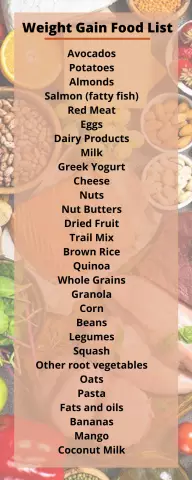- Author Rachel Wainwright wainwright@abchealthonline.com.
- Public 2023-12-15 07:39.
- Last modified 2025-11-02 20:14.
Muscle diet

Muscle Diet is a specially balanced diet that helps to build muscle mass and reduce body fat. A beautiful healthy body with prominent muscles is the result of not only regular physical activity, but also a healthy, nutritious diet. What foods are needed for muscle growth? Why do many muscle mass diets not work? What are the principles for gaining weight and muscle mass?
Muscle Diet: Nutritional Basics for Gaining Muscle Mass
The modern sports nutrition industry offers a wide range of nutritional supplements, drugs that promote enhanced muscle tissue growth. The main goal of any sports nutrition product is to optimize the processes in the body aimed at increasing muscle mass and burning fat deposits, ensuring the full value of the diet, and increasing the body's endurance. However, no supplement can replace the muscle-building nutrition offered by a muscle-based diet. Compliance with a muscle diet does not exclude the use of auxiliary drugs to accelerate muscle gain. Sports nutrition will provide the body with the necessary macro- and microelements for normal functioning and growth.
The muscle diet is a balanced diet, the main purpose of which is to create conditions for the body in which muscle mass increases and body fat decreases significantly.
The basic principles of a muscle diet are:
- Fractionality of nutrition - the optimal diet when observing a diet - food intake up to 6 times a day, while up to 70% of the total amount of food is consumed before 16.00. Fractional nutrition will avoid unnecessary stress on the digestive system. The fractional intake of nutrients in the blood helps to maintain muscle nutrition. Eating the same amount of food of the same calorie content in 3 doses will provide the formation of fatty deposits, which will be extremely difficult to get rid of with such a high-calorie diet;
- The ratio of consumed and received calories - for the growth of muscle mass, the body must receive more calories than consumed daily;
- High-calorie foods - up to 70% of the diet should consist of the maximum calorie foods that the muscle diet allows for consumption. This will avoid additional stress on the digestive system. A diet for gaining muscle mass recommends reducing the proportion of fruits and vegetables in the diet to 30%, since the vegetable fiber they contain stimulates bowel movements and prevents the digestion and absorption of high-calorie foods;
- Low in fast carbohydrates and fats - fast carbohydrates are monosaccharides that have a high glycemic index and increase blood sugar levels. During a muscular diet, it is extremely important to reduce the proportion of fat (fatty meats, sausages, oils and margarines), which, provided there is an adequate supply of nutrients, will be deposited in the body, contributing to the build-up of body fat. Fast carbohydrates include confectionery and bakery products, and sweet fruits. With excessive use of fast carbohydrates in the body, a protective reaction to an increase in blood sugar levels is triggered - the conversion of glucose into fat;
- Maintaining the correct water balance - when following a muscle-based diet, the body needs an increased level of water to support all metabolic processes. The total amount of water, taking into account its content in all consumed products, should reach 3 liters per day;
- The correct diet, which provides the body with enough nutrients in the morning, before training, and enough light, fast-digesting food before bed. The last meal should be no later than 3 hours before going to bed. Dinner should consist mainly of vegetables, fish, eggs and fermented milk products. Breakfast should provide the body with a sufficient amount of protein;
- The correct ratio of nutrients to calories in the diet with a muscle diet is the key to successful growth in muscle mass. So, carbohydrates should account for up to 60% of the calorie content of the entire diet, proteins - up to 30% of the calorie content of the daily diet, fats - up to 10% of the calorie content of the diet (a decrease in the proportion of fat will lead to a restructuring of the body and a sharp decrease in body weight).
Diet for muscle mass: the basis of the diet

The Muscle Diet offers a wide variety of foods. The main focus of the diet for muscle mass is on high-calorie foods, as well as foods high in protein. The variety of foods offered by the diet for gaining muscle mass allows you to create an individual complete diet:
- An affordable source of protein is meat (poultry and lean red meats), fish and seafood, low-fat dairy products, eggs, nuts, legumes;
- The source of carbohydrates is cereals (whole grain bread, oatmeal, buckwheat, corn, rice porridge, durum wheat pasta). Also, carbohydrates are found in large quantities in vegetables, mushrooms, fruits, herbs, nuts. The Muscle Diet recommends eating fruits and greens in limited quantities to avoid digestive overload. It is recommended to compensate for their exclusion with a vitamin and mineral complex;
- The source of fats is fish oil, flaxseed oil, mustard oil (mainly Omega-3 fatty acids).
The main mistakes when following a diet for gaining muscle mass are:
- Overeating - guided by the principle of a muscle diet about the ratio of calories received and expended, many begin to overeat, which contributes to the rapid gain in body weight and the growth of fat cells (adipocytes), and not muscle tissue;
- Violation of the diet - when most of the calories come from the evening meal;
- The complete elimination of fat from the diet will provoke a violation of fat metabolism, which will stop the burning of the fat layer located above the muscle tissue.
How to gain weight and muscle mass correctly?
A beautiful muscle relief is the result of not only proper nutrition for muscle mass, but also proper physical exertion, which is physical stress for the body, forcing the muscles to adapt to power loads, and, accordingly, grow. When wondering how to gain weight and muscle mass correctly, you need to understand two basic principles:
- Correct adherence to a muscle diet should lead to an increase in body weight of 600 g per week. If this indicator is lower, therefore, it is necessary to look for errors in the compiled menu and calculate its calorie content and energy costs of the body;
- Consult an experienced trainer to develop the correct strength load.
Many people turn to dietary supplements in their attempts to gain weight and muscle mass. However, for optimal effect, sports nutrition must be carefully introduced into the diet at a certain stage, in consultation with the instructor.
Found a mistake in the text? Select it and press Ctrl + Enter.






